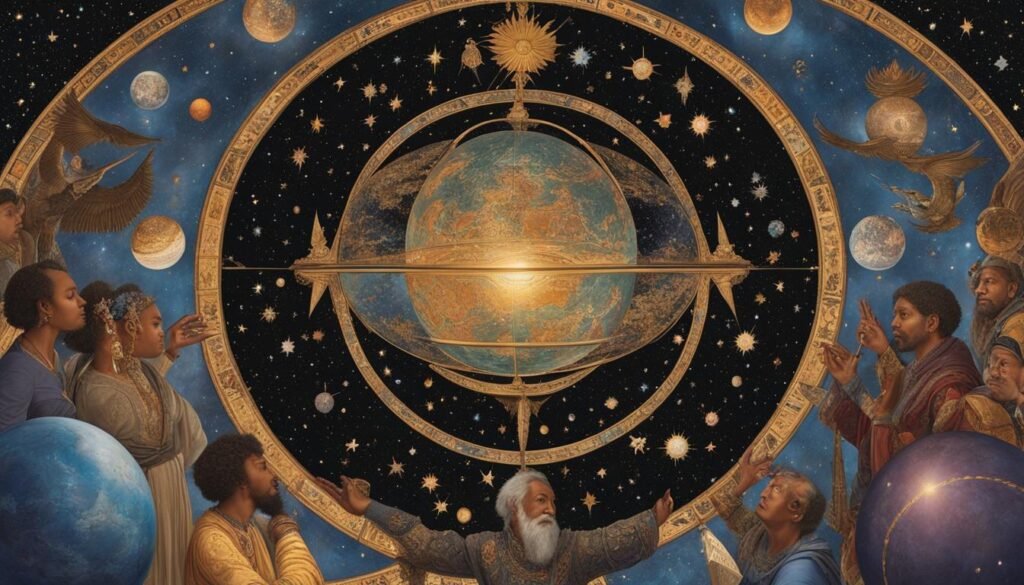Welcome to our latest article series on exploring planetary influences across different cultures. It’s fascinating to observe how cultural differences can shape the interpretation of these cosmic forces. From the significance of celestial events to the interpretation of horoscopes, planetary influences are an integral part of many cultures worldwide. However, these interpretations can vary significantly from one culture to the next, which can have a significant impact on intercultural communication and cross-cultural interactions.
In this section, we will examine some of the cultural differences in interpreting planetary influences and explore how they impact intercultural communication and cross-cultural interactions. Are you interested in learning more about how diverse cultures around the world interpret planetary influences? Then let’s dive into this exciting topic together!
Key Takeaways:
- Cultural differences across cultures can significantly impact interpretation of planetary influences.
- Intercultural communication and cross-cultural interactions can be affected by cultural differences in interpreting cosmic events.
- Understanding these differences is crucial in developing a global perspective and fostering greater understanding and harmony among cultures.
Understanding Cultural Nuances and Astrological Beliefs
When it comes to interpreting planetary influences, cultural nuances and astrological beliefs play a significant role. These factors shape how different cultures view and interpret celestial events, leading to variations in astrological practices and beliefs around the world.
That’s why having a global mindset and embracing multiculturalism is crucial to understanding these cultural differences. By acknowledging and appreciating cultural diversity, you can better adapt and navigate cross-cultural interactions and conversations about planetary influences.
To illustrate this point, consider the Chinese New Year, one of the most important traditional festivals celebrated by Chinese people worldwide. In Chinese astrology, each year is tied to a specific animal sign from the Chinese zodiac, which is believed to influence personal characteristics and fortunes. While the Chinese New Year is not traditionally celebrated in Western cultures, many people may have heard of the Chinese zodiac and know their own animal sign. However, the significance and interpretation of these animal signs differ between the two cultures, emphasizing the importance of understanding cultural nuances and perspectives.
In the same vein, the different astrological systems used worldwide and associated cultural influences underscore the importance of cultural awareness and adaptation.
The Role of Cultural Awareness and Intelligence
Developing cultural awareness and cultural intelligence is essential in navigating and appreciating the cultural differences surrounding planetary influences. To better understand how cultural differences shape beliefs about planetary influences, it’s important to develop a global perspective. This means recognizing and being open to different cultural interpretations and value systems.
Cultural intelligence can also help in building trusting relationships across cultures. When you understand how and why different cultures interpret planetary influences the way they do, you can be more sensitive and responsive in your interactions with people from those cultures. This leads to greater peace and understanding among individuals and communities.
The Importance of Cultural Awareness
Cultural awareness involves gaining a deeper understanding of the values, customs, and beliefs of different cultures. It entails understanding how these factors shape beliefs about planetary influences and other aspects of life. When developing cultural awareness, it’s important to recognize that no culture is superior to any other, and that every culture has its unique strengths and vulnerabilities.
By acknowledging the diversity and beauty of different cultures, you become more culturally sensitive and aware, leading to more meaningful cross-cultural interactions. This can help build better relationships with people from different backgrounds and lead to more harmonious multicultural societies.
The Importance of Cultural Intelligence
Cultural intelligence involves the ability to adapt and effectively interact with people from different cultures. It entails learning about different cultural norms, customs, and practices as they relate to planetary influences and other aspects of life.
Cultivating cultural intelligence involves developing a set of skills to navigate different cultural contexts. These skills include being open and receptive to cultural differences, being empathetic, and being able to adapt your communication style to suit different cultural settings.
Case Studies: Cultural Differences in Planetary Influence Interpretation
Real-life case studies provide invaluable insights into the variations in interpreting planetary influences across different cultures. These examples showcase the need for a global perspective when studying and understanding these cultural differences. Let’s look at a couple of examples:
The Role of Astrology in Indian Culture
In Indian culture, astrology plays a vital role in daily life. It is commonly consulted before making important decisions, such as marriage or business ventures. According to Indian astrology, the position of the planets at the time of birth can significantly influence a person’s life. For example, in Indian astrology, the position of the planet Mars is considered influential in determining a person’s career path and professional success.

“The position of the planet Mars is considered influential in determining a person’s career path and professional success.”
Astrology in Western Culture
In contrast, in Western culture, astrology tends to be viewed as less significant in decision-making and daily life. However, there is still a significant following among those who believe in the impact of planetary influences. Western astrology tends to focus on the zodiac signs and their interplay with the planets. For example, those born under the sign of Libra are said to have a natural harmony and balance, and the planet Venus is believed to influence their emotional and social behavior.
“Western astrology tends to focus on the zodiac signs and their interplay with the planets.”
These examples highlight the vastly different interpretations of planetary influences across cultures and the need for a global perspective to better understand and appreciate these cultural differences.
Conclusion
Cultural differences in planetary influences can present unique challenges when navigating intercultural communication and cross-cultural interactions. However, by understanding and embracing these differences, we can foster greater understanding and harmony among cultures.
Having a global mindset and embracing multiculturalism is crucial in appreciating the nuances of astrological beliefs across different cultures. Additionally, cultivating cultural awareness and intelligence can aid in navigating these differences and building stronger relationships.
Real-life case studies have shown the importance of having a global perspective when studying and interpreting planetary influences. By recognizing the significance of cultural diversity and adaptation, we can bridge the gaps in understanding and create a more inclusive world.
In conclusion, gaining a deeper understanding of cultural differences in planetary influences is essential in today‘s interconnected world. By keeping an open mind and embracing these differences, we can build stronger connections and promote mutual respect and understanding.
Navigating Life’s Tides: The Transformative Power of Moon Readings
Imagine having a compass that not only guides you through life’s ebbs and flows but also teaches you how to harness the moon’s powerful energy. A moon reading offers just that—a beacon of insight in a sea of uncertainty, empowering you to navigate life’s tides with grace and confidence. Curious about how the moon’s phases can unveil a roadmap tailored just for you? Explore the transformative power of moon readings and steer your life towards harmony and fulfillment.
Click here to learn more about the power of Moon Readings
FAQ
What are planetary influences and why do they differ across cultures?
Planetary influences refer to the beliefs and interpretations of how celestial bodies affect human behavior and events. These interpretations can vary greatly across cultures due to historical, religious, and societal factors that shape each culture’s unique worldview.
How do cultural differences in planetary influences impact intercultural communication?
Cultural differences in interpreting planetary influences can affect communication by influencing individuals’ beliefs, values, and decision-making processes. Understanding these differences can help foster effective and respectful cross-cultural interactions.
How can having a global mindset and embracing multiculturalism enhance understanding of cultural nuances in astrology?
Having a global mindset and embracing multiculturalism allows individuals to appreciate and respect diverse interpretations of planetary influences. This mindset encourages curiosity and empathy, enabling a deeper understanding of cultural nuances in astrology.
What is the role of cultural awareness and intelligence in navigating cultural differences in planetary influence interpretation?
Cultural awareness and intelligence play crucial roles in understanding and adapting to cultural differences in interpreting planetary influences. Developing cultural awareness helps individuals recognize and appreciate unique perspectives, while cultural intelligence allows for effective navigation of cross-cultural interactions.
Can you provide examples of case studies that demonstrate cultural differences in planetary influence interpretation?
Certainly! In India, astrological beliefs heavily influence daily lives and decision-making processes. In contrast, Western cultures tend to focus more on individualism and scientific explanations. These case studies highlight the need for a global perspective when studying and understanding these cultural differences in interpreting planetary influences.
What are planetary influences and why do they differ across cultures?
Planetary influences refer to the beliefs and interpretations of how celestial bodies affect human behavior and events. These interpretations can vary greatly across cultures due to historical, religious, and societal factors that shape each culture’s unique worldview.
How do cultural differences in planetary influences impact intercultural communication?
Cultural differences in interpreting planetary influences can affect communication by influencing individuals’ beliefs, values, and decision-making processes. Understanding these differences can help foster effective and respectful cross-cultural interactions.
How can having a global mindset and embracing multiculturalism enhance understanding of cultural nuances in astrology?
Having a global mindset and embracing multiculturalism allows individuals to appreciate and respect diverse interpretations of planetary influences. This mindset encourages curiosity and empathy, enabling a deeper understanding of cultural nuances in astrology.
What is the role of cultural awareness and intelligence in navigating cultural differences in planetary influence interpretation?
Cultural awareness and intelligence play crucial roles in understanding and adapting to cultural differences in interpreting planetary influences. Developing cultural awareness helps individuals recognize and appreciate unique perspectives, while cultural intelligence allows for effective navigation of cross-cultural interactions.
Can you provide examples of case studies that demonstrate cultural differences in planetary influence interpretation?
Certainly! In India, astrological beliefs heavily influence daily lives and decision-making processes. In contrast, Western cultures tend to focus more on individualism and scientific explanations. These case studies highlight the need for a global perspective when studying and understanding these cultural differences in interpreting planetary influences.

